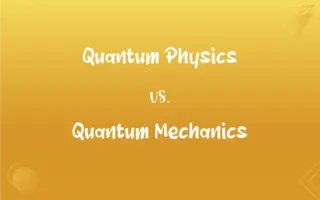Hard Disk vs. RAM: What's the Difference?
Edited by Janet White || By Harlon Moss || Updated on October 6, 2023
Hard disk is a non-volatile data storage device; RAM (Random Access Memory) is a volatile memory used for temporary data storage and quick data retrieval.

Key Differences
The hard disk serves as the perpetual memory of a computer system, ensuring that data is retained even when the system is powered down. It comes in various forms, such as HDDs (Hard Disk Drives) and SSDs (Solid State Drives), each with its own technological characteristics and applications. Your hard disk is where all your files, applications, and the operating system reside, being accessible upon boot-up of your computer.
In comparison, RAM is transient and functions as the working memory of a computer. Any operation, calculation, or execution of applications is performed in RAM because accessing data in RAM is exponentially faster than from a hard disk. However, all the information stored in RAM is wiped out once the power is turned off, emphasizing its temporary nature.
A hard disk typically has a larger storage capacity, ranging from hundreds of gigabytes (GB) to several terabytes (TB), and it holds data long-term. It is crucial for storing large files, applications, and the operating system, which can be accessed and utilized upon demand, regardless of whether the computer has been restarted or shut down.
Conversely, RAM has significantly less capacity than a hard disk – commonly between 4GB to 64GB in most computers. This limited storage is because RAM is designed to hold data that is currently in use or being processed, allowing for rapid access and enhancing the speed and performance of computational tasks by providing the processor quick data access.
While hard disks provide permanent data storage, they generally retrieve and write data much slower than RAM. This factor is pivotal in determining the speed at which applications load and at which data can be written to the storage. SSDs, a type of hard disk, have somewhat bridged this speed gap, but they are still slower in comparison to RAM.
ADVERTISEMENT
RAM’s advantage lies in its blazing fast data retrieval and write speeds, enabling real-time data processing, quick application responsiveness, and smooth multitasking on a computer. It is an indispensable component for ensuring a system runs smoothly and responsively, handling numerous applications and processes concurrently.
Comparison Chart
Type of Storage
Non-volatile (Permanent)
Volatile (Temporary)
Speed
Slower than RAM
Significantly faster
Capacity
Larger (e.g., 500GB - 2TB)
Smaller (e.g., 4GB - 64GB)
Function
Store data permanently
Temporary storage for running applications
ADVERTISEMENT
Dependency on Power
Retains data without power
Loses data without power
Hard Disk and RAM Definitions
Hard Disk
The hard disk can store data even without power.
You will find all your saved files on the hard disk after rebooting the computer.
Ram
RAM is a volatile memory, losing its data when power is off.
If the computer shuts down unexpectedly, data in the RAM is lost.
Hard Disk
Hard disks provide vast storage capacities for data and applications.
I store all my movies and games on an external hard disk.
Ram
RAM enables smooth multitasking by providing quick data access.
Having 16GB of RAM allows me to run multiple applications simultaneously.
Hard Disk
The hard disk is prone to damage if mishandled or subjected to extreme conditions.
His hard disk was damaged due to the heavy impact of the fall.
Ram
Insufficient RAM can slow down a computer’s performance.
My computer started lagging due to the limited RAM when running heavy software.
Hard Disk
Hard disks come in traditional HDD and modern SSD formats.
My laptop has a fast SSD hard disk that improves boot time.
Ram
RAM is available in different types, like DDR4 and DDR5.
Gamers often prefer DDR5 RAM for its superior performance.
Hard Disk
A hard disk is a permanent data storage device.
Save the document on your hard disk to avoid data loss.
Ram
Upgrading RAM can be a cost-effective way to enhance computer performance.
I improved my laptop’s speed by installing additional RAM.
Ram
Digital memory hardware in which information can be accessed in any order with equal speed.
Ram
A male sheep.
Ram
A battering ram.
FAQs
Can a hard disk affect the boot time of a computer?
Yes, a faster hard disk (like an SSD) generally leads to quicker boot times compared to a slower HDD.
Why is RAM faster than a hard disk?
RAM is designed to quickly read and write data, facilitating real-time processing and multitasking.
What is the primary purpose of a hard disk?
The hard disk serves to permanently store data, applications, and the operating system.
How to determine if your computer needs more RAM?
Persistent slowdowns, especially during multitasking or using heavy applications, might indicate a need for more RAM.
Can a computer function without a hard disk?
While a computer might boot via network or removable media, a hard disk is essential for regular use and data storage.
What happens when a hard disk is formatted?
Formatting a hard disk erases all data and sets up a new file system, making it ready for data storage.
Can too much RAM usage damage the RAM?
No, high usage won’t damage RAM but it might make the system slow if fully utilized.
How does a hard disk connect to a motherboard?
Hard disks typically connect via SATA or NVMe interfaces, providing data and power connections to the motherboard.
What is virtual memory?
Virtual memory uses hard disk space to emulate RAM, providing additional but slower memory when RAM is full.
Can high RAM usage be reduced?
High RAM usage can be reduced by closing unused applications, upgrading RAM, or adjusting system settings.
Is data on the RAM permanent?
No, RAM holds temporary data that is lost when power is removed.
Can RAM affect gaming performance?
Yes, sufficient RAM is vital for smooth gaming, affecting load times and gameplay quality.
What is external hard disk used for?
External hard disks are used to expand storage, back up data, and transfer files between computers.
What happens if RAM fails?
RAM failure typically leads to system instability, crashes, and inability to perform memory-intensive tasks.
Is it possible to upgrade a computer’s RAM?
Yes, RAM can often be upgraded to improve performance, though limits and compatibility depend on the motherboard.
How does SSD differ from traditional HDD in terms of hard disk technology?
SSDs use flash memory for fast data access and have no moving parts, unlike HDDs which use magnetic storage and have moving components.
Is data recovery possible from a failed hard disk?
Data recovery from a failed hard disk can sometimes be achieved through specialized services and software.
How can I check the health of my hard disk?
Health of a hard disk can be checked using built-in OS tools or third-party software, monitoring for errors or bad sectors.
Why does a computer slow down if RAM is full?
When RAM is full, the system resorts to using the slower hard disk for temporary data, reducing performance.
Can a computer run without RAM?
No, RAM is crucial for a computer to operate as it provides the necessary working memory for functionality.
About Author
Written by
Harlon MossHarlon is a seasoned quality moderator and accomplished content writer for Difference Wiki. An alumnus of the prestigious University of California, he earned his degree in Computer Science. Leveraging his academic background, Harlon brings a meticulous and informed perspective to his work, ensuring content accuracy and excellence.
Edited by
Janet WhiteJanet White has been an esteemed writer and blogger for Difference Wiki. Holding a Master's degree in Science and Medical Journalism from the prestigious Boston University, she has consistently demonstrated her expertise and passion for her field. When she's not immersed in her work, Janet relishes her time exercising, delving into a good book, and cherishing moments with friends and family.






































































